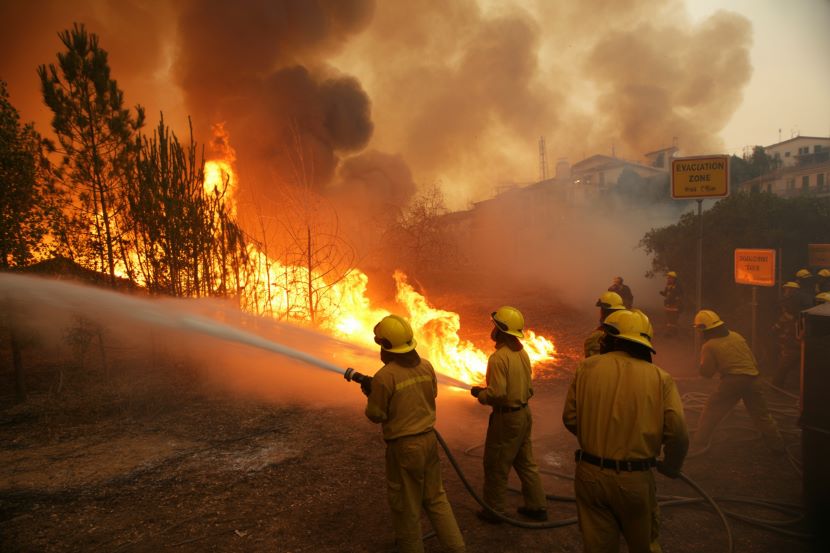Published on
August 17, 2025
Wildfires are ravaging large parts of southern Europe, with Spain and Portugal facing some of the worst fires in two decades. As of this week, seven people have tragically lost their lives, and over 575 square miles of land have been destroyed across Spain. With temperatures exceeding 44°C, the heatwave combined with high winds has created a deadly mix, and the crisis is showing no signs of slowing down. As the fires spread, the UK Foreign Office has issued travel warnings for tourists planning to visit Spain and Portugal, urging travelers to stay updated on the situation and avoid fire-affected areas.
For travelers planning vacations in the Mediterranean region, the ongoing crisis serves as a stark reminder of the dangers posed by summer wildfires, which continue to intensify in the wake of rising temperatures. This tragic series of events has made it clear that wildfires are a growing concern across Southern Europe, with an impact extending beyond just the local population.
Spain and Portugal: Battling the Blazes Amid Record Heat
In Spain, wildfires have been particularly devastating, especially in the Castile and Leon, Galicia, Asturias, and Extremadura regions. These areas have seen 14 major fires, with conditions worsening due to high winds and scorching temperatures. Army units have been mobilized to assist emergency services, and authorities have urged residents to stay indoors and avoid unnecessary travel, including closing roads and rail lines.
Portugal has also deployed thousands of firefighters to battle blazes in its central and northern regions. The fires have forced the evacuation of hundreds of residents from popular tourist areas, as the country continues to deal with dangerous fire conditions. In both countries, the ongoing wildfires are significantly disrupting daily life, with power outages and closed roads in fire-affected areas.
The European Commission has pledged support to both countries, offering financial aid for firefighting efforts and disaster relief, underscoring the growing urgency of the situation. However, the death toll and damage to property, farmland, and natural ecosystems continue to rise.
Greece and Turkey: Continued Firefighting Efforts
The fire crisis also extends to Greece, where a wildfire on the island of Chios has been burning for four consecutive days. As firefighters struggle to contain the flames, evacuations have been carried out in affected areas. Greece has been on high alert, with wildfires also affecting Athens and surrounding areas. Wildfire smoke is even impacting air quality in several regions, making it unsafe for vulnerable populations.
Meanwhile, in Turkey, the situation is slightly more contained, but the country’s firefighting teams continue to manage blazes in several provinces, particularly in the Aegean region. Last month, fires forced thousands to flee their homes, resulting in multiple fatalities. Authorities are closely monitoring the fires, ensuring safety for residents and tourists alike. The wildfires are a grim reminder of the increasing frequency and intensity of such events across Southern Europe.
Impact on Travel: How Wildfires Are Affecting Tourism
For tourists, the ongoing wildfire crisis is significantly altering travel plans in affected regions. Popular destinations in Spain, Portugal, and Greece are experiencing disruptions, as many attractions, beaches, and hiking areas remain closed for safety reasons. Travel advisories from the UK Foreign Office have specifically warned against traveling to wildfire-affected areas.
The fires not only threaten the safety of travelers but also have broader economic impacts. Tourism is a vital part of the economies of southern Europe, and these wildfires are causing major disruptions to businesses in the hospitality and tourism sectors. Local businesses are struggling to cope with the loss of income, while flights and travel services are often delayed or canceled due to the fire risks.
For travelers who are still determined to visit these areas, it is crucial to stay informed about the situation. Local government websites and emergency services will provide updates, including safe routes and evacuation procedures, so visitors can adjust their plans accordingly.
Travel Advice for Tourists: Stay Safe and Be Prepared
If you are planning to travel to Spain, Portugal, or Greece, here are some tips to stay safe during the wildfire crisis:
Stay Updated: Always check official travel advisories from the UK Foreign Office or local government websites for up-to-date information on wildfire conditions in the areas you plan to visit.Avoid Affected Areas: If wildfires are reported in your destination or nearby, consider rescheduling or changing your travel plans to avoid danger.Health Precautions: Wildfire smoke can impact air quality, particularly in areas near active fires. Travelers should be cautious, especially those with respiratory conditions. Wearing masks and staying indoors during smoky conditions is advised.Follow Local Guidelines: Respect the advice of local authorities, especially regarding travel restrictions, evacuations, or safety procedures. The situation can change rapidly, and being prepared can save lives.Travel Insurance: Ensure that you have comprehensive travel insurance that covers cancellations, delays, and emergency evacuations due to natural disasters like wildfires.Conclusion: A Difficult Summer for Southern Europe
The devastating wildfires currently raging across Spain, Portugal, and other parts of southern Europe are a stark reminder of the growing threat posed by climate change. As the death toll rises and the damage continues to mount, both residents and tourists are grappling with the consequences of these unprecedented fires.
For tourists, it’s essential to exercise caution and stay informed. While the allure of southern Europe’s beaches, historic towns, and scenic landscapes remains strong, safety should always come first. The UK Foreign Office and other governmental bodies will continue to issue guidance to ensure that travelers can navigate the crisis safely.
As tourism in these regions faces disruptions, it is hoped that international cooperation and increased funding for firefighting efforts will help mitigate the impact on the local populations and economies. For travelers planning to visit, flexibility and preparedness are key.
